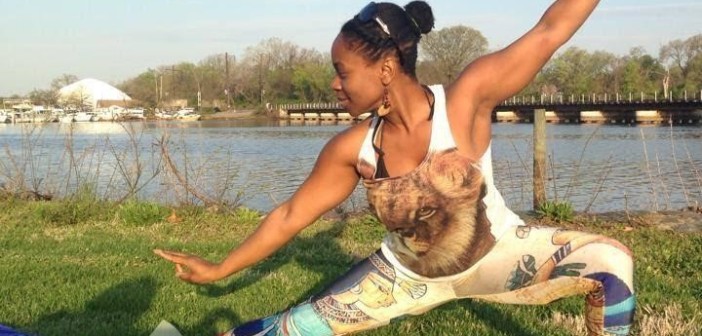In Search of ”Mind-Body” Justice
BY STEWART LAWRENCE
Is yoga – the ancient Hindu breathing and posture practice – relevant to African-
Americans? Not by the appearance of things. Anyone familiar with today’s yoga culture can’t
help but notice how skinny, white and middle class the movement seems. Glossy trade
magazines like Yoga Journal rarely feature African-American models in their pages. And look at
the yoga classes held in most local studios. Even those spreading to inner city, multi-ethnic
neighborhoods typically feature aspiring professionals that live elsewhere. It’s not that African-
American participation is actively discouraged; it’s just that most yoga marketing and branding
is still geared to upwardly mobile consumers with a certain lifestyle ethos. And according to the
latest market research studies, well over 80% of these consumers are white women.
Thirty-six year old Sariane Leigh is trying to change the face of yoga. Four years ago she
established Washington, DC’s first yoga studio devoted to serving low-income African-American
residents. The studio is located “across the river” in Anacostia, a large section of Southeast
Washington, DC that is predominantly Black, poor and underserved at every level. Leigh had
learned and taught yoga in more affluent areas of the city and was excited about the health and
spiritual benefits that the practice could offer. But as a politically conscious African-American
woman, she felt that the predominant yoga ethos — as well as the sheer cost of the classes —
placed it beyond the orbit of her community.
In 2009, when she struck out on her own, Leigh didn’t know what to expect. Now, more
than a decade later, her studio, Anacostia Yogi, is not only thriving, but Leigh herself is
becoming more visible as a local health activist and advocate. Her low-priced classes, most of
them taught in local community centers, go beyond teaching basic yoga postures to include
advice on better health, dieting, and nutrition — including poses designed to ameliorate
diabetes and hypertension and mental and emotional support for Black families experiencing
high levels of stress. Leigh also provides advice on where to purchase low-cost mats and stretch
pants at half the prices charged in posh yoga apparel stores like Lululemon that typically cater
to wealthy suburbanites.
Leigh views yoga as more than a personal health and fitness program. She describes
herself as a “wellness revolutionary” consciously linking the pursuit of greater inner peace to
the struggle for “mind-body justice,” which she defines as an ability to stay grounded and
strong in one’s interactions in the world. She co-sponsors with another African-American yogi,
Taheera Tucker, an annual “mind-body justice” retreat in rural Virginia where students not only
learn the basics of yoga practice but techniques for fully incorporating its energy and principles
into their daily lives. “If there is one thing my discovery of yoga has taught me, it is to confront
change,” Leigh says. “With yoga, I’ve realized that if I can manage change on the inside I can
face almost anything happening on the outside.”
And Leigh’s just getting started. Her next project is to take yoga to African-American
youngsters, especially girls, to help them build self-esteem and make better life choices earlier
in their lives. Leigh’s spirit of including yogis of every body type and background has even
rubbed off on a growing number of Washingtonians from other parts of the city who’ve begun
moving to Anacostia in recent years, part of an early wave of urban “homesteaders”. At a
recent yoga class, nearly half her students were White, and several were men.
Leigh, who once felt marginalized from mainstream yoga as a Black woman proud of her
ample curves, is bringing a fresh pioneering spirit to an age-old sacred spiritual practice. And it
all started, she says, with a “desire to live freely and to breathe the breath of life.” It’s an
example that other aspiring yogis anxious to promote the practice’s health benefits more
widely would do well to emulate.



